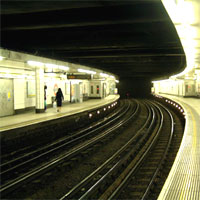
 Train, plane or car. What's best for business travel? Not so long ago there was no hesitation in the answer. Car for short to mid journeys, plane for long, and the train trailing a distant, dirty, uncompetitive, undependable third — with facilities and service to match.
Train, plane or car. What's best for business travel? Not so long ago there was no hesitation in the answer. Car for short to mid journeys, plane for long, and the train trailing a distant, dirty, uncompetitive, undependable third — with facilities and service to match.
No more. All has been reversed. Today's UK and cross-channel trains offer a comfortable, clean, inexpensive, reliable, viable and speedy service with facilities specifically aimed at the business traveller.
Rail travel is more than just a good alternative to the car with its high running costs, difficult parking, traffic jams, London congestion charge, stress, and non-working environment. It's also a viable alternative to the plane with its weather restrictions and inconvenient "out-of-town" destination and departure points. It is becoming more so as increasingly sophisticated and high tech installations are incorporated into carriages and on station areas.
Alex Gray, communications manager for a Manchester-based software products manufacturing company, who has to commute between Manchester and London Euston up to six times a month, is a railway convert. What helped make up his mind was the arrival of Virgin Trains' new tilting, 125mph Pendolino on its West Coast Main Line service. "There is a service every half hour and the journey takes about two hours," he says. "The trains are comfortable and give you a chance to settle. There is a power point for a laptop at your seat and they are bringing in wireless internet access."
In contrast, air passengers must choose between five airlines using four London airports and, if they miss a flight, may have to wait up to eight hours for the next service with the same carrier.
Plugging in to business
According to Virgin, more and more business executives are switching allegiance to the railways as they see the advantage of being able to plug in laptops and mobile phones and so have the ability to keep on working throughout their journey. The growth figure comes despite heavy competition from air and coach operators, as well as the car.
Charles Belcher, managing director of the West Coast Mainline franchise, said: "It has never been easier or quicker to catch a train between key cities. Passengers clearly value a seamless journey without speed cameras, airport check-ins, congestion charges and the hassle of transferring to and from the city centre." Pendolino travellers can enjoy the convenience of First Class direct travel with a spacious working environment and a wide range of audio entertainment.
Jane Vincent, of the Association of Train Operating Companies (ATOC), naturally places the train above the car for business travel adding to the work-on-the-move scenario with the fact that a train is also the least environmentally damaging form of transport and that the ATOC has started trials into using sulphur-free diesel which will make trains even more environmentally friendly.
She also points out that performance is getting much better — between 85% and 90% on a regular basis. Also, £4.5billion has been spent on new trains, there will be 4,500 new trains on the network by the end of this year, and there is an average growth in passenger journeys of between three and four per cent a year.
Instant information
National Rail, run by ATOC, has also made use of new technology giving call centre agents and passengers alike access to real-time information on arrivals and departures (www.nationalrail.co.uk). This is also available through TrainTracker, the automated National Rail Enquiries telephone service which uses speech recognition and touch-tone technology, and through the newly launched SMS service, TrainTracker™ Text for requesting real-time departures and arrivals information straight to a mobile telephone.
To use it, travellers need to send a text message to 48 49 50 with the name of the station they wish to travel to and from. Cost is 25p per text received, plus the standard cost of sending a text to the service.
Train operators are continually up-dating their facilities and services to the benefit of the business passenger. GNER, for instance, first to offer wi-fi on board a train in December 2003, is planning a major expansion of this Internet service across its entire fleet. The ambitious scheme will transform every GNER train into a "mobile office" allowing travellers to check e-mails and surf the Internet while they travel at speed.
GNER's chief operating officer Jonathan Metcalf said: "We believe the expanded service will encourage more people to choose rail instead of driving or flying at a time when we are introducing many more comfortable and reliable trains. Wireless internet is already proving invaluable to our business customers as a means of transforming train time into more productive working time."
GNER's First Class passengers can enjoy the benefits of wireless internet on a complimentary basis while passengers in Standard accommodation pay a small supplementary charge, depending on how long they wish to remain online.
Christopher Garnet, GNER chief executive, says that on internal UK journeys the train "competes strongly against the plane on speed for city centre to city centre journeys, reliability, price, productive time spent on board and, often, on quality. We believe sensible public policy decisions over the next few years could ensure that a larger slice of the domestic and European travel market is secured by high-speed, high quality rail services."
Hi-tec link-up
Southern Rail is another company keen on wireless access and has teamed up with T-Mobile (www.t-mobile.co.uk) to trial the system on board trains between London and Brighton. "Other routes will be added after the initial route has proven success," says spokesman Mike Adamson. "We are using lineside transceivers as opposed to a satellite based system, which has the advantage of much higher bandwidth capability and connection speed."
Prices for the service when fully launched will be the same as other T-Mobile locations. This is currently £5 an hour for an occasional user (you can pay the trolley steward) or £20 per month on subscription.
First Great Western, one of the UK's premier intercity railways running services on main routes linking London with Bristol, Cardiff, south Wales and the West Country, carries 60,000 passengers on 185 high-speed trains every day and is constantly investing to improve services and reliability. The operator says they will be introducing new look carriages from 2006 which will include 240V power sockets per bay for laptop use and wi-fi technology.
Specifically for travelling executives, the company has a Business Direct service that includes direct reservation and booking, advice on travel requirements across the UK and into Europe, tailored travel packages to meet companies' individual needs, organisation of all travel documentation, a dedicated ex-directory telephone link with a range of booking options, and monitored travel expenditure through the provision of detailed management information (www.firstgreatwestern.co.uk).
Eurostar gets down to business
Eurostar, whose services will move from London Waterloo to London St Pancras International in 2007 with the opening of the final stretches of the Channel Tunnel Rail Link, report a surge in popularity for business travel. Of its 1.7million passengers during the first three months of this year, around 400,000 were travelling on business, up by 10% on last year. "These figures reflect a strategy introduced in 2004 of focussing more closely on the business traveller," said Eurostar's Director of Communications Paul Charles. "Over half our trains have now been refurbished and we will be announcing further changes later this year."
The refurbishment of Eurostar's 27 trains includes, for business travellers, "ease of working with real comfort," he adds. "In First Class, the emphasis is on creating an extension of the office with plenty of room for working. All these carriages include new-style seats with pushbutton reclining mechanism, new tables and table lights, power sockets for laptops or mobile phones and "snooze-friendly" pillows. In standard class, the main change is extra luggage space. Each train now has 750 seats with two standard class carriages having power sockets (www.eurostar.com).







